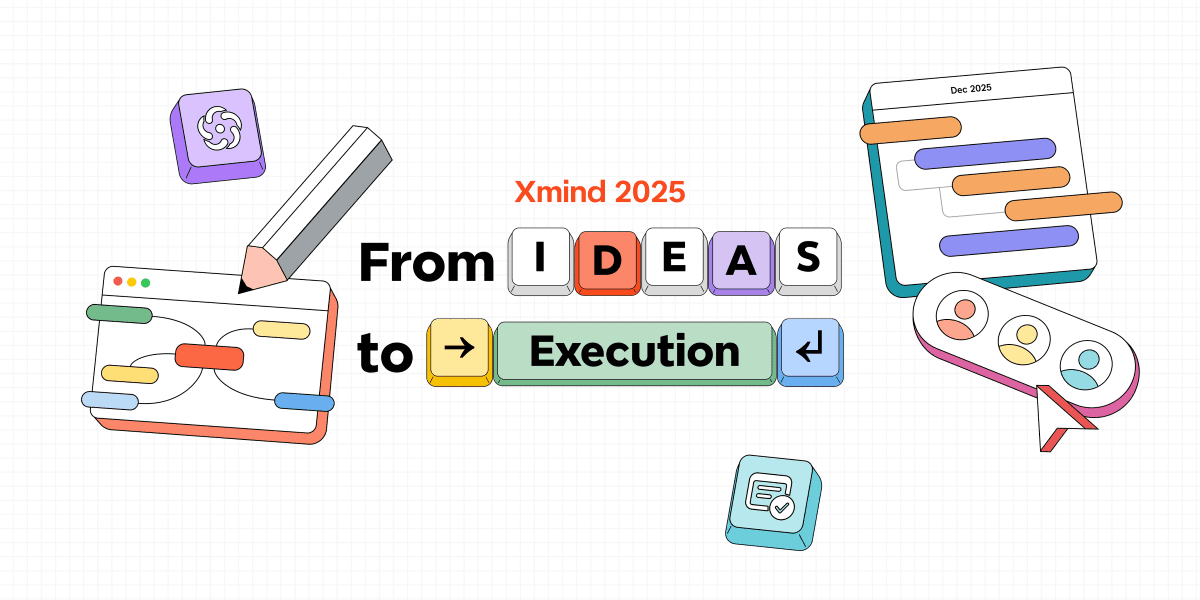Aug 27, 2025
PMP certification in 2025: honest guide for beginners

Hannah
Want a PMP certification to boost your career prospects? The PMP has established itself as one of the most valuable project management credentials, with over a million certification holders worldwide.
Ready to begin your certification experience? Xmind can help you create your study plan.
Is PMP certification worth it for beginners?
Are you new to project management and wondering if a PMP certification is worth your time? The answer is a clear yes. This certification offers real benefits to beginners who want to make their mark in the field.
Career growth and salary potential
A PMP certification can significantly boost your earnings. PMP certified professionals earn about USD 120,000 yearly, while their non-certified counterparts make around USD 90,000. This means PMP holders earn 33% more on average.
The financial rewards show up quickly. Approximately two-thirds of PMP holders experienced a total pay increase within one year of obtaining certification. The benefits grow as your career advances. Project managers with 15-20 years of experience earn about USD 140,000, and those with over 20 years can make USD 150,000.
New project managers find that PMP certification helps them advance faster and stand out in a competitive job market.
Industry demand and job opportunities
Project management jobs are currently in high demand. PMI predicts companies will need to fill 2.2 million project-related positions yearly through 2027. The global economy is expected to require 25 million more project professionals by 2030.
This high demand means beginners with PMP certification can step into various roles:
Project coordinator (Average salary: USD 53,981)
Portfolio and program manager (Average salary: USD 90,542)
Project director (Average salary: USD 94,685)
Product owner (Average salary: USD 107,748)
PMP certification proves valuable in various sectors, including healthcare, finance, manufacturing, government, energy, and retail, which actively seek certified project managers. Canadian organizations highlight this trend - 71% list PMP certification as preferred or required for project management roles.
Global recognition and credibility
The best reason for beginners to get PMP certified is its worldwide acceptance. Organizations in over 200 countries recognize this credential. Since 2007, it has kept ISO/IEC accreditation in more than 85 countries that follow these standardization practices.
Many companies now require PMP certification for specific project management positions. This worldwide recognition enhances your credibility with stakeholders, clients, and employers, while demonstrating your commitment to excellence.
A PMP holder puts it well: "When people see PMP behind my name, they understand that I'm speaking with authority on project management". New project managers find this instant credibility helpful when competing against more experienced candidates.
CAPM vs PMP: choosing the right path
Key differences in requirements
CAPM and PMP certifications target different career stages. CAPM works best for newcomers and serves as a first step into project management. The PMP demonstrates that you have solid experience in managing projects.
For CAPM certification, you need:
High school diploma or global equivalent
23 contact hours of project management education completed before the exam
The PMP certification needs more experience:
Path 1: Four-year degree + 36 months leading projects + 35 hours of project management education
Path 2: High school diploma/associate's degree + 60 months leading projects + 35 hours of project management education
The good news is that active CAPM holders are exempt from the 35-hour education requirement when applying for PMP certification.
Which one is easier to start with?
Without doubt, CAPM suits beginners better and takes less effort than the PMP certification.
The CAPM exam consists of 150 questions, divided into four domains. You get three hours to complete it with a 10-minute break. Questions test your knowledge of project management basics, predictive methods, agile frameworks, and business analysis frameworks.
PMP is more challenging with 180 questions across three domains: people, process, and business environment. You get 230 minutes with two 10-minute breaks. Half the questions focus on predictive approaches, and the other half test agile or hybrid methods.
Money-wise, CAPM costs less:
CAPM: $225 for PMI members ($374 total with membership) or $300 for non-members
PMP: $405 for PMI members ($554 total with membership) or $675 for non-members
When to upgrade from CAPM to PMP
Your career growth should guide your move from CAPM to PMP. You can't directly switch from CAPM to PMP, but CAPM gives you great preparation to get PMP later.
The right time to upgrade comes when:
You have enough project leadership experience (3-5 years)
Senior project management roles interest you
You want to show advanced project leadership skills
In spite of that, CAPM brings quick benefits while you gain experience:
Sets you apart from other entry-level candidates
Helps you learn project management basics
Meets the 35-hour education requirement for the PMP exam
Both certifications have different renewal rules. CAPM needs 15 Professional Development Units (PDUs) every three years. PMP requires 60 PDUs in the same period.
Using Xmind to plan your PMP journey
Getting ready for the PMP exam requires organization and a well-laid-out plan. Visual tools like Xmind make this process easier by turning complex certification requirements into clear, practical steps. You can start your PMP prep today with Xmind's powerful visualization tools.
How Xmind helps with study planning
Xmind makes your PMP preparation simpler by breaking down complex project management concepts into digestible visual components. The platform lets you sort tasks clearly with subtopics, labels, and notes. This eliminates wasted time figuring out what to study next.
Xmind's mind mapping features boost memory retention and understanding by organizing information visually. You can focus and recall details better during exam preparation. Instead of dealing with endless text notes, you can utilize multiple structures to strengthen your memory. A central topic like "PMP Exam" branches out to each knowledge area.

Creating a visual mindmap for PMP preparation
Xmind shines at visualizing projects from start to finish. Here's how to build your PMP roadmap:
Use "PMP Certification" as your central topic
Generate subtopics for key exam domains
Add sub-branches for specific subtopics within each domain
Use colors or markers to prioritize study areas
Tracking progress and managing time
Xmind helps you organize priorities, set boundaries, and control your study schedule easily. The platform's task tracking features let you monitor your progress live. This ensures you stay on schedule throughout your certification prep.
You can turn ideas into practical steps with Generate as Todos in Create with AI. This feature allows you to assign tasks and track progress directly within your mind map—perfect for managing your PMP study plan.
How to get PMP certification in 2025

Eligibility checklist
You must meet one of these three paths to qualify for PMP certification in 2025:
Path 1 (High school diploma):
High school or secondary diploma
60 months (5 years) of experience leading projects within the past 8 years
35 hours of project management education/training or CAPM certification
Path 2 (Bachelor's degree):
Bachelor's degree or global equivalent
36 months (3 years) of experience leading projects within the past 8 years
35 hours of project management education/training or CAPM certification [131]
Path 3 (GAC-accredited program):
Bachelor's degree from a GAC-accredited program
24 months (2 years) of experience leading projects within the past 8 years
35 hours of project management education (GAC coursework fulfills this requirement)
Note that your experience must be non-overlapping and should focus on leading or directing projects. PMI has simplified the process and now tracks months of experience instead of specific hours (previously 4,500 or 7,500 hours).
Application process overview
Here's what you need to do to apply for PMP:
Create a PMI account - Sign up at PMI.org before you begin
Gather application materials - Prepare your:
Complete the application - You can save your progress as you work on the online application
Submit and await review - PMI reviews most applications within 5 business days
Pay the exam fee - The 2025 fee is $425 for PMI members and $595 for non-members
Schedule your exam - Select either a Pearson Vue Testing Center or online proctored exam
PMI randomly audits applications, so keep your documentation ready. This includes copies of your degree, supervisor-signed experience verification, and proof of 35 training hours. You'll have 90 days to submit these materials if audited.
Timeline from start to finish
Your PMP certification could take anywhere from 6 weeks to 6 months based on how you prepare:
Phase 1: Eligibility & Application (2-3 weeks)
Documentation gathering: 1-2 weeks
Application completion: 1 week
PMI application review: 5 business days
Phase 2: Exam Preparation (4-12 weeks)
Exam study time: Successful candidates usually spend 60-120 hours
Most people take 2-6 months depending on their pace
Phase 3: Exam & Certification (1-2 weeks)
Schedule your exam right after approval
Complete 180 questions in 230 minutes
Your certification stays valid for three years. After that, you'll need 60 Professional Development Units (PDUs) to maintain it.
PMP exam and renewal details you should know
Study resources and prep tips
Most PMP candidates spend between 60-120 hours studying. PMI data shows successful exam takers put in about 35 hours of prep work. Many professionals take anywhere from one week to six months to study.
You'll need these study resources:
PMBOK Guide: Your primary reference for exam prep
PMI Study Hall: Practice questions and mock exams
Exam simulators: Get familiar with the exam environment
Your chances of passing improve when you practice regularly with sample questions and score 85% or higher on practice exams.
PDUs and how to maintain your certification
Your PMP certification needs 60 Professional Development Units (PDUs) every three years to stay active. These PDUs must include:
Minimum 35 Education PDUs (at least 8 PDUs in each PMI Talent Triangle area: Ways of Working, Power Skills, and Business Acumen)
Maximum 25 Giving Back PDUs
You can earn Education PDUs through courses, conferences, reading, and digital media. Giving Back PDUs come from working as a practitioner (up to 8), volunteering, creating content, or mentoring.
Conclusion
PMP certification helps project management professionals boost their careers at every level. You can begin with CAPM or go straight for PMP certification. Your certification trip needs good planning and focused preparation. Xmind makes this process easier by a lot. You can visualize requirements, track progress, and organize study materials better.
You have everything you need to decide about getting PMP certified. Ready to move forward? Map your certification path with Xmind's visualization tools and take your project management career to the next level.
FAQs
Q1. How long does it typically take to prepare for the PMP exam?
The preparation time for the PMP exam varies, but most successful candidates spend between 60-120 hours studying. This can translate to anywhere from one week to six months, depending on your study pace and prior experience.
Q2. What are the eligibility requirements for PMP certification?
To be eligible for PMP certification, you need either a four-year degree with 36 months of project leadership experience, or a high school diploma with 60 months of project leadership experience. Additionally, you must complete 35 hours of project management education or hold a CAPM certification.
Q3. How much does PMP certification cost?
The cost of PMP certification includes the exam fee, which is $405 for PMI members and $555 for non-members. There may be additional costs for study materials and prep courses. If retakes are necessary, they cost $275 for members and $375 for non-members.
Q4. What is the format of the PMP exam?
The PMP exam consists of 180 questions to be completed in 230 minutes. It covers three domains: People (42%), Process (50%), and Business Environment (8%). The questions are in various formats, including multiple-choice, multiple-response, matching, and limited fill-in-the-blank.
Q5. How do I maintain my PMP certification after passing the exam?
To maintain your PMP certification, you need to earn 60 Professional Development Units (PDUs) every three years. This includes a minimum of 35 Education PDUs and a maximum of 25 Giving Back PDUs. PDUs can be earned through various activities such as courses, conferences, reading, and volunteering.






